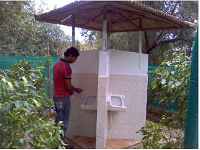/regions/india
India
A simple yet effective filtration and sterilization technique to obtain clean drinking water: Paper in the Current Science Journal
Posted on 06 Feb, 2013 07:40 PMThe paper ‘Simple filtration and low-temperature sterilization of drinking water’, describes how a straight forward, simple technique can provide clean drinking water that is pathogen free, using a simple sari!
A communication and advocacy strategy framework for sanitation and hygiene, by the Ministry of Drinking Water and Sanitation and UNICEF (2012-17)
Posted on 05 Feb, 2013 08:44 PMThe number people practicing open defecation in India is more than 600 million. Though the access to improved sanitation has increased since 2000 the pace of change has been slow. If the current trend continues then it will be difficult for the country to meet its Millenium Development Goal for sanitation. Thus accelerating access to and use of toilets and hygiene practices have become a national priority.
Punjab ranks highest in the country, in level of water pollution caused by industries - Roundup of the week’s news (January 28 - February 3, 2013)
Posted on 04 Feb, 2013 05:20 PMWater pollution by industries: Punjab ranks highest
State-wise data on damage caused due to floods during 1953-2011- A compilation by Central Water Commission
Posted on 04 Feb, 2013 02:05 PMFloods/heavy rains can cause a severe and irreversible damage to human lives, property both public and private, and livestock. Since floods are one of the frequent natural calamities faced by India, the loss incurred by it is huge.
Tamil Nadu government allocates Rs.100 crore to strengthen water resources across the state- Newsletter from 'The Resource and Information Network for the Coasts (TRINET)', February 2013
Posted on 04 Feb, 2013 01:26 PM
The February edition of the TRINet has the following highlights:
The city corporation of Madurai decides to power all the parks with solar energy.
A resource book on waterless urinals, an ecological sanitation method that saves water, energy and uses urine as a resource
Posted on 02 Feb, 2013 05:40 PM
Waterless urinals (WLU) save water, energy and use urine as resource ( Image courtesy: R Sakthivel)
Environment statistics - A compendium by the Ministry of Statistics and Programme Implementation (2012)
Posted on 02 Feb, 2013 12:24 PMThe Ministry of Statistics and Programme Implementation (MoSPI) has come up with a Compendium of Environment Statistics 2012, the thirteenth edition of the series, which started in 1997. The compendium aims at providing high quality statistical information to improve knowledge of the environment, to support evidence-based policy and decision making, and to provide information for the general public, as well as for specific user groups. The statistics are multidisciplinary and cross-cutting, involving numerous sources and stakeholders.
Working with digital maps by leveraging the power of GIS - Report of a course held at IIHS, Bangalore
Posted on 31 Jan, 2013 06:12 PMIndian Institute for Human Settlements (IIHS), a national education institution committed to the equitable, sust
How is the water cycle represented in our text books ? - An analysis of science textbooks of the NCERT and Maharashtra State Board
Posted on 30 Jan, 2013 08:10 PMIn the recent times visual representation has acquired significant attention. These are in forms of photographs, sketches and schematic diagrams. At school level they are helpful in introducing abstract concepts in science. For this purpose they need to be appropriately integrated in the textbook. In the backdrop of this context this paper in Contemporary Education Dialogue is based on the analysis of the science textbooks of the National Council of Educational Research and Training (NCERT) and the Maharashtra State Board (MSB) for Classes 3–10.

Water cycle- Illustration courtesy : Sourabh Phadke
Everyone can conserve water at home: Follow the example of Anita, an IWP volunteer in Mumbai
Posted on 30 Jan, 2013 03:37 PMWater, as we all know is going to be the next biggest problem. With climate change already looming large, we have to consciously prepare for the future. On an individual level we can do our bit to contribute towards water conservation.
I, as a homemaker have implemented a few practices at home.